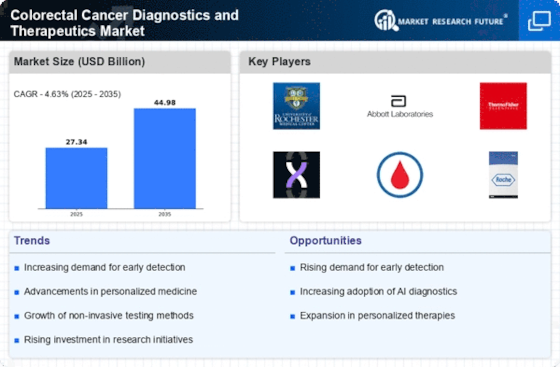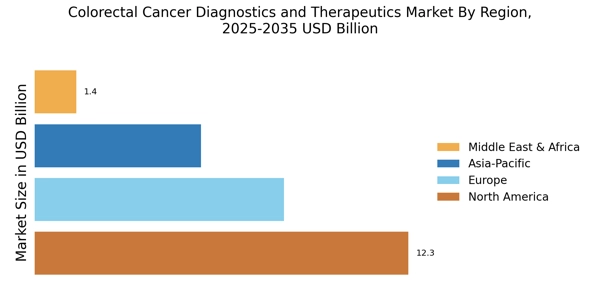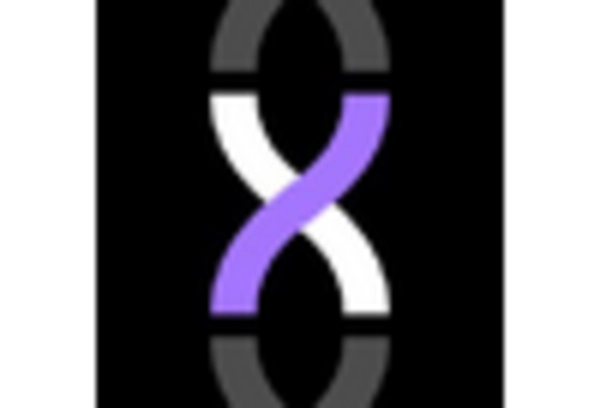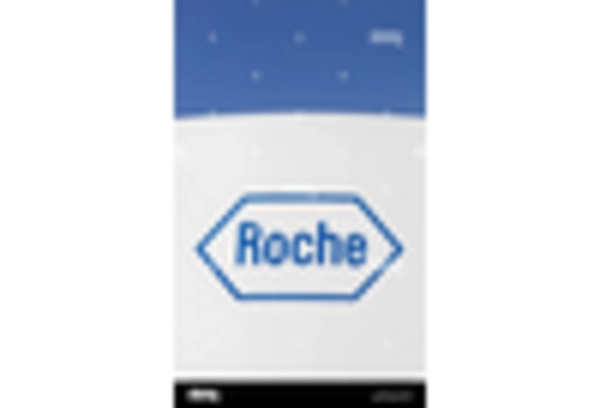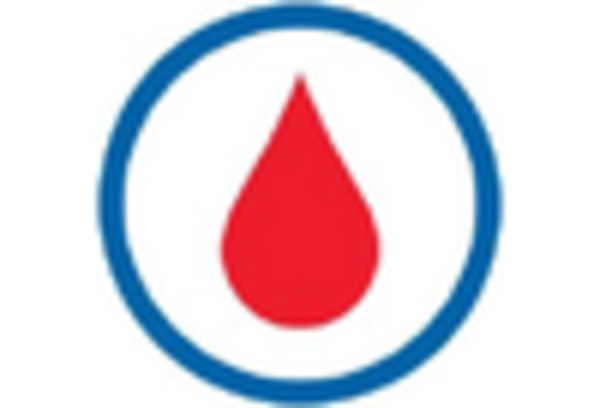Growing Incidence of Colorectal Cancer
The rising incidence of colorectal cancer is a primary driver for the Colorectal Cancer Diagnostics and Therapeutics Market. According to recent statistics, colorectal cancer ranks as the third most common cancer worldwide, with millions of new cases diagnosed annually. This alarming trend necessitates enhanced diagnostic and therapeutic solutions, prompting healthcare providers and researchers to invest in innovative technologies. The increasing prevalence of risk factors such as obesity, sedentary lifestyles, and aging populations further exacerbates this issue. As awareness of the disease grows, there is a corresponding demand for effective screening and treatment options, thereby propelling the market forward. The urgency to address this public health challenge is likely to stimulate advancements in both diagnostics and therapeutics, ensuring that the market remains dynamic and responsive to emerging needs.
Rising Demand for Personalized Medicine
The shift towards personalized medicine is a notable trend within the Colorectal Cancer Diagnostics and Therapeutics Market. Tailoring treatment plans based on individual genetic profiles and tumor characteristics has shown promise in enhancing therapeutic efficacy. This approach not only improves patient outcomes but also minimizes adverse effects associated with traditional therapies. The market for targeted therapies is expanding, with a growing number of drugs receiving regulatory approval for specific genetic mutations related to colorectal cancer. As healthcare providers increasingly adopt personalized treatment strategies, the demand for companion diagnostics that identify suitable candidates for these therapies is also on the rise. This trend indicates a significant transformation in how colorectal cancer is managed, emphasizing the importance of precision medicine in the ongoing battle against this disease.
Technological Innovations in Diagnostics
Technological advancements in diagnostic tools are significantly influencing the Colorectal Cancer Diagnostics and Therapeutics Market. Innovations such as liquid biopsies, advanced imaging techniques, and artificial intelligence-driven analysis are revolutionizing how colorectal cancer is detected and monitored. For instance, the introduction of non-invasive screening methods has improved early detection rates, which is crucial for successful treatment outcomes. The market for diagnostic imaging is projected to grow substantially, driven by the increasing adoption of these cutting-edge technologies. Furthermore, the integration of digital health solutions, including telemedicine and mobile health applications, enhances patient access to diagnostic services. As these technologies continue to evolve, they are expected to play a pivotal role in shaping the future landscape of colorectal cancer diagnostics, ultimately leading to improved patient outcomes and a more efficient healthcare system.
Supportive Government Policies and Funding
Supportive government policies and funding initiatives are crucial drivers of the Colorectal Cancer Diagnostics and Therapeutics Market. Many governments are prioritizing cancer control strategies, allocating resources to enhance research, screening, and treatment programs. Increased funding for colorectal cancer research has led to significant advancements in understanding the disease and developing new therapeutic options. Additionally, policies promoting access to screening and treatment services are essential in reducing disparities in healthcare. The establishment of national cancer registries and data collection initiatives further supports evidence-based decision-making in public health. As governments continue to recognize the economic and social burden of colorectal cancer, their commitment to funding and policy support is likely to foster innovation and improve patient care in the diagnostics and therapeutics landscape.
Increased Awareness and Screening Initiatives
Heightened awareness of colorectal cancer and the importance of early detection are driving factors in the Colorectal Cancer Diagnostics and Therapeutics Market. Public health campaigns and educational initiatives have successfully informed populations about the risks and symptoms associated with colorectal cancer. As a result, there has been a marked increase in screening rates, particularly among high-risk groups. The implementation of guidelines recommending regular screenings starting at age 45 has further contributed to this trend. Increased screening not only facilitates early diagnosis but also leads to a greater demand for diagnostic services and therapeutic interventions. This proactive approach to cancer management is likely to continue influencing market dynamics, as stakeholders recognize the value of early detection in improving survival rates and reducing treatment costs.


